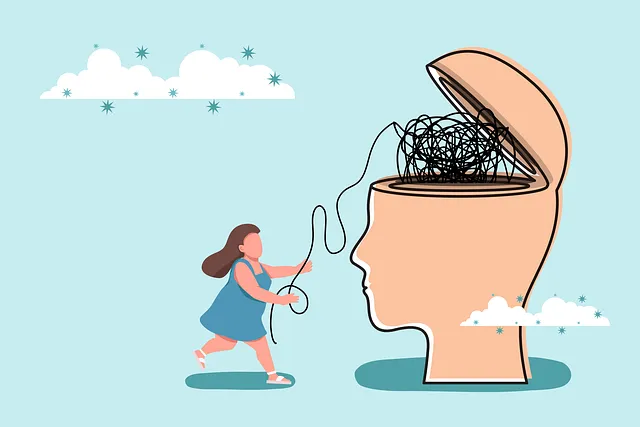The Parker Kaiser Permanente Mental Health Access Center employs skilled facilitators to lead group therapy sessions, addressing various mental health concerns. These facilitators create safe, supportive environments through open communication and active listening, encouraging participants to share experiences and learn from one another. By introducing coping strategies like mindfulness meditation and education on burnout prevention, they empower individuals with tools for stress management and mood regulation. The center's focus on cultural sensitivity and engaging activities fosters a sense of community, enhancing mental wellness through tailored interventions proven effective via risk assessments and behavioral tracking.
Mental wellness group facilitation plays a pivotal role in fostering collective support and enhancing individual well-being. This article explores effective techniques employed at the Parker Kaiser Permanente Mental Health Access Center, where facilitators create safe spaces for profound transformation. We’ll delve into the unique roles of facilitators, strategies to build trust and encourage engagement, and methods for measuring the significant impact of group sessions. Understanding these techniques can empower both professionals and individuals seeking mental health support.
- Understanding Mental Wellness Group Facilitation
- Role of a Facilitator at Parker Kaiser Permanente Mental Health Access Center
- Techniques to Create a Safe and Supportive Environment
- Strategies for Effective Communication and Engagement
- Measuring Success: Evaluating the Impact of Group Sessions
Understanding Mental Wellness Group Facilitation

Mental wellness group facilitation is a specialized skill that plays a crucial role in supporting individuals navigating emotional challenges and mental health issues. It involves creating a safe, supportive environment where participants can connect, share experiences, and gain insights from one another. The Parker Kaiser Permanente Mental Health Access Center recognizes the power of peer-led support and group dynamics in enhancing mental wellness.
Effective facilitation techniques foster open communication, encourage active participation, and promote emotional healing processes. Facilitators guide conversations, ensuring every voice is heard and respected. By incorporating activities, discussions, and exercises tailored to individual needs, facilitators help group members develop valuable coping strategies for managing stress and improving mood regulation. These sessions cater to diverse mental health concerns, offering a sense of community and shared understanding among participants.
Role of a Facilitator at Parker Kaiser Permanente Mental Health Access Center

At the Parker Kaiser Permanente Mental Health Access Center, facilitators play a pivotal role in fostering a supportive and therapeutic environment. Their primary task is to guide groups, ensuring an inclusive space where individuals can openly discuss mental health challenges and strategies for coping. Facilitators are trained professionals who employ various techniques to enhance group dynamics, such as encouraging active participation through interactive activities and facilitating meaningful conversations.
One of the key responsibilities is introducing and guiding practices like mindfulness meditation, which helps members manage stress and promote self-care routine development. Additionally, facilitators offer valuable insights on burnout prevention, enabling participants to develop resilience against mental health setbacks. Through their expertise, they create a safe haven where individuals can build connections, share experiences, and gain new perspectives on improving and maintaining their overall mental wellness.
Techniques to Create a Safe and Supportive Environment

Creating a safe and supportive environment is paramount for effective mental wellness group facilitation. Techniques such as establishing clear boundaries, ensuring confidentiality, and promoting active listening foster trust among participants at the Parker Kaiser Permanente Mental Health Access Center. Facilitators should create a non-judgmental space where everyone feels seen and heard, encouraging open dialogue about personal experiences.
Incorporating elements like Cultural Sensitivity in Mental Healthcare Practice ensures that diverse perspectives are respected and valued. This involves understanding and adapting to each individual’s cultural background, beliefs, and preferences. Facilitators can also enhance group dynamics by incorporating coping skills development activities, such as stress management techniques, problem-solving strategies, and mindfulness meditation exercises. These practices enable participants to build resilience and develop personal tools for navigating mental health challenges.
Strategies for Effective Communication and Engagement

Effective communication is key to facilitating a supportive and engaging environment at the Parker Kaiser Permanente mental health access center. Group facilitators play a vital role in guiding discussions, ensuring every member feels heard and respected. Active listening skills are essential; this involves paying close attention to participants’ experiences and emotions, validating their feelings, and responding thoughtfully. Facilitators should encourage open dialogue by creating a safe space where individuals feel comfortable sharing their thoughts, fostering a sense of community.
Engagement strategies can include interactive activities like role-playing scenarios or group discussions centered around specific themes relevant to mental wellness. For instance, introducing Compassion Cultivation Practices can be a powerful tool. This involves guiding members through exercises that enhance self-awareness and empathy, allowing them to explore their emotions and develop a deeper understanding of one another. Additionally, providing Mental Wellness Journaling Exercise Guidance can empower individuals to reflect on their experiences, track progress, and share insights with the group.
Measuring Success: Evaluating the Impact of Group Sessions

Measuring success in group facilitation goes beyond simply filling a room with participants. It’s about evaluating the tangible impact on mental wellness, much like the comprehensive approach taken by Parker Kaiser Permanente Mental Health Access Center. This involves assessing progress through various lenses, from individual perspectives to broader community dynamics. Group sessions should foster improvements in emotional regulation, enhance self-care practices, and provide new coping mechanisms that participants can apply in their daily lives.
The effectiveness of these techniques is best gauged through regular risk assessments for mental health professionals, ensuring the safety and well-being of both facilitators and group members. By integrating feedback from participants and tracking behavioral changes over time, facilitators can tailor interventions to meet the evolving needs of the group, ultimately fostering a more supportive and healing environment, as evidenced by ongoing improvements in emotional resilience and self-care awareness.
Mental wellness group facilitation plays a pivotal role in creating supportive environments at institutions like the Parker Kaiser Permanente Mental Health Access Center. By employing techniques that foster safety and engagement, facilitators can revolutionize the way individuals cope with their mental health. Through effective communication strategies and thoughtful evaluation methods, these groups become powerful tools for personal growth and recovery. This approach not only enhances the services provided by centers such as the PKP Mental Health Access Center but also ensures that folks receive comprehensive care in a supportive setting.



